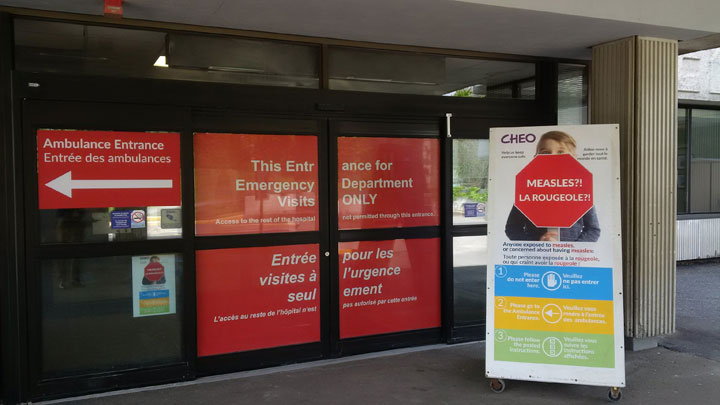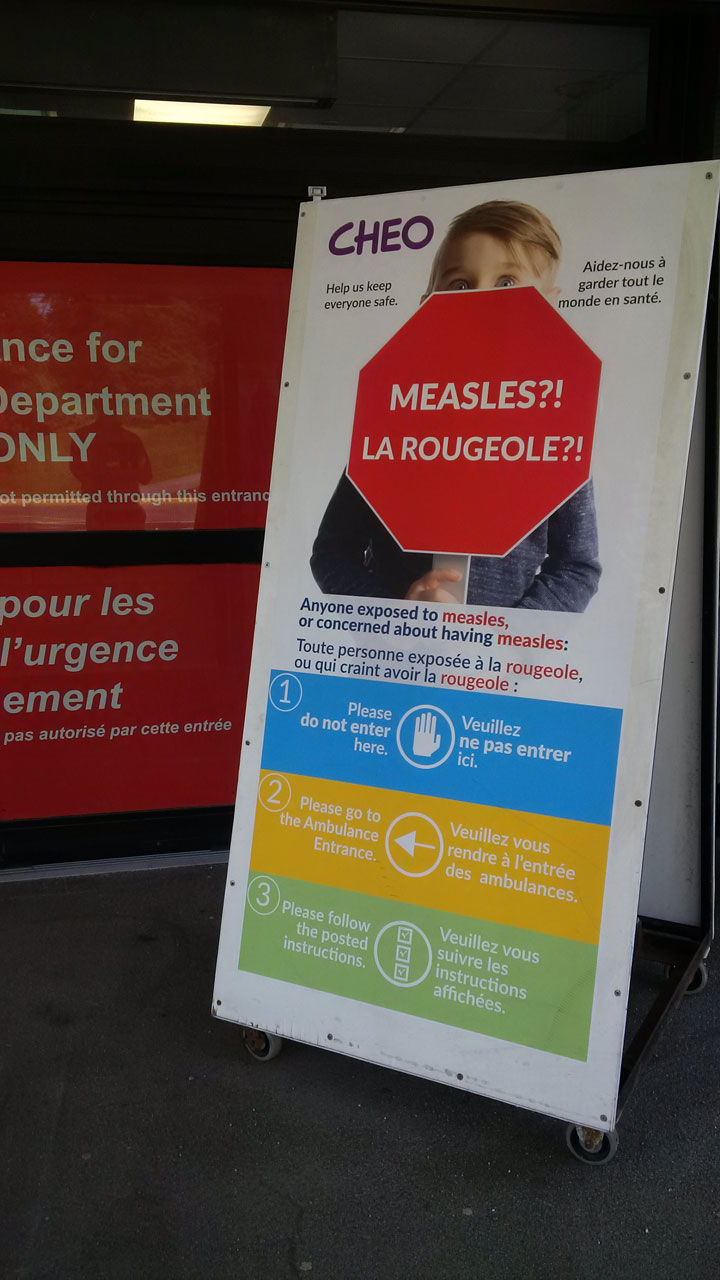Measles cases are relatively rare in Canada, compared to other parts of the world, but they still happen.

Travellers occasionally contract the disease abroad and bring it back home – potentially exposing and infecting people they meet.
Here’s how to recognize the symptoms of measles and what to do if you think you or a loved one has it.
Symptoms
Some of the early symptoms of measles include a high fever, cough and runny nose, said Dr. Sarah Wilson, a public health physician with Public Health Ontario.
“One of the challenges is that it starts off with pretty non-specific symptoms, and by that I mean the kinds of symptoms that many of us have had before,” she said.
WATCH: Dr. Chris Sikora of Alberta Health Services explains some of the symptoms and outcomes of contracting measles

But early measles does have one distinctive feature – red eyes, or conjunctivitis.
“People will have those symptoms with fever for a few days before the rash appears,” she said.
According to the Public Health Agency of Canada, the rash typically appears three to seven days after the first symptoms. That rash – red, splotchy and beginning on the face and spreading downward – is typically what makes people think of measles rather than another illness, Wilson said.
In some cases, people who have had some immunization to measles – like one of the two recommended doses of vaccine – might not show all the early symptoms, like fever, before they develop the rash, said Dr. Nisha Thampi, medical director of infection prevention and control at CHEO, a pediatric health and research centre in Ottawa.

Get weekly health news
Finding a doctor
If you see these symptoms and start suspecting measles, your first step should be to call the local public health department if they’re available, said Thampi.
In Ottawa, she said, “someone from Ottawa Public Health can review the symptoms as well as what we call the epidemiology, or look for a link between the symptoms that you’re having if they’re concerning for measles and an exposure to measles.”
They can then tell you the best way to obtain medical care.
WATCH: WHO issues measles warning in Europe

You can also call your family physician, Wilson said.
“Call your doctor’s office, explain that you’re concerned about and that you might have measles, and make arrangements with that doctor’s office for when you can safely be seen by your provider to have testing for measles,” she said.
“That’s really important because we want to really avoid people showing up unannounced and potentially exposing lots of people in doctors’ waiting room areas.”
Wilson and Thampi both say you shouldn’t just show up at a doctor’s office or emergency room unannounced if you suspect measles.
Wilson suggests that if you are going to the emergency room, try to call ahead or if you can’t, let staff know you’re concerned about measles as soon as you arrive.
At CHEO, Thampi said, there are signs warning people to use a different entrance if they’re concerned about measles, to keep them isolated from everyone else in the emergency department.
“Measles is the most contagious infectious disease,” she said. “And risks of measles-related complications are not infrequent.”
People who are at risk of catching measles or of developing serious complications, like infants too young to be immunized, pregnant women, and people with compromised immune systems, are also more likely to be in a doctor’s office or hospital waiting room than the average person, Wilson said.
Your doctor will likely choose an appointment time when there won’t be other patients around – like at the end of the day – to prevent transmission of the virus, she said. In a hospital setting, suspected measles cases might be taken out of the waiting room and given a face mask to wear while they wait to be seen by a doctor.
You should let your doctor know if you haven’t been immunized, or if you’ve been travelling overseas, or if you’ve potentially been in contact with someone who had measles, or anything else that makes you suspect the virus, Wilson said.
Unfortunately, Thampi said, there is no cure for measles.
“It’s really about supporting them,” she said.
“If they just have the rash, then it’s just making sure that they’re comfortable. If they develop complications, including ear infection, lung infection or other things, it’s again supportive care.”










Comments
Want to discuss? Please read our Commenting Policy first.